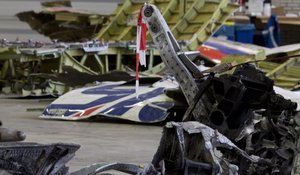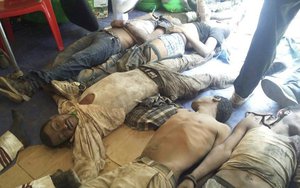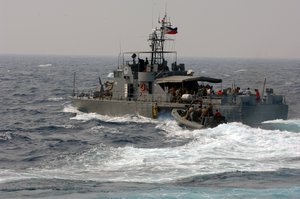- published: 18 Nov 2011
- views: 176738
-
remove the playlistUnited Nations System
- remove the playlistUnited Nations System
- published: 21 Nov 2012
- views: 3753
- published: 15 Apr 2015
- views: 53739
- published: 23 Oct 2014
- views: 213
- published: 04 May 2010
- views: 16642
- published: 19 Sep 2016
- views: 4
- published: 08 May 2015
- views: 10438
- published: 28 Apr 2015
- views: 3793

United Nations
The United Nations (UN) is an intergovernmental organization to promote international co-operation. A replacement for the ineffective League of Nations, the organization was established on 24 October 1945 after World War II in order to prevent another such conflict. At its founding, the UN had 51 member states; there are now 193. The headquarters of the United Nations is in Manhattan, New York City, and experiences extraterritoriality. Further main offices are situated in Geneva, Nairobi and Vienna. The organization is financed by assessed and voluntary contributions from its member states. Its objectives include maintaining international peace and security, promoting human rights, fostering social and economic development, protecting the environment, and providing humanitarian aid in cases of famine, natural disaster, and armed conflict.
During the Second World War, US President Franklin D. Roosevelt initiated talks on a successor agency to the League of Nations, and the United Nations Charter was drafted at a conference in April–June 1945; this charter took effect 24 October 1945, and the UN began operation. The UN's mission to preserve world peace was complicated in its early decades by the Cold War between the US and Soviet Union and their respective allies. The organization participated in major actions in Korea and the Congo, as well as approving the creation of the state of Israel in 1947. The organization's membership grew significantly following widespread decolonization in the 1960s, and by the 1970s its budget for economic and social development programmes far outstripped its spending on peacekeeping. After the end of the Cold War, the UN took on major military and peacekeeping missions across the world with varying degrees of success.
This article is licensed under the Creative Commons Attribution-ShareAlike 3.0 Unported License, which means that you can copy and modify it as long as the entire work (including additions) remains under this license.
- Loading...

-
 1:56
1:56How does the United Nations work? | RMIT University
How does the United Nations work? | RMIT UniversityHow does the United Nations work? | RMIT University
RMIT University academic Dr Binoy Kampmark explains how the United Nations (The UN) works. Watch other videos in this series http://goo.gl/sHD22 And if you have a question about how something works that you want answered, hit us up here http://ow.ly/7LQJQ Study Social Humanities http://www.rmit.edu.au/socialhumanities -
 32:00
32:00Inside the Issues 3.9 | The United Nations System
Inside the Issues 3.9 | The United Nations SystemInside the Issues 3.9 | The United Nations System
The United Nations (UN) system includes an array of specialized agencies and bodies that cover a broad range of ideas from human rights and democracy to nuclear non-proliferation and global governance. What's working well? What isn't? Are the criticisms of some of the major organs, such as the Security Council, valid? Which functional agencies are in need of strengthening? Alistair Edgar, ACUNS (The Academic Council on the United Nations System), stops by Inside the Issues for a discussion of the UN system, its strengths and its weaknesses. He notes that while we tend to think of the UN as a huge bureaucracy with ample resources, it is far smaller, weaker and underfunded than we may imagine. -
 8:11
8:11What is United Nations and What Does it Do? - Mini Documentary
What is United Nations and What Does it Do? - Mini DocumentaryWhat is United Nations and What Does it Do? - Mini Documentary
This mini documentary would explain you what is United Nations (UN), what does it do and what role does it play in shaping the future of the world. ► Subcribe to My Channel: https://www.youtube.com/user/RehmanSiddiq?sub_confirmation=1 ► Vist My Website: http://www.RehmanSiddiq.com ► Follow me on Facebook: http://www.facebook.com/a.rehman.siddiq ► Follow me on Twitter: http://www.twitter.com/rehmansid The United Nations is an intergovernmental organization established 24 October 1945 to promote international co-operation. A replacement for the ineffective League of Nations, the organization was created following the Second World War to prevent another such conflict. At its founding, the UN had 51 member states; there are now 193. The headquarters of the United Nations is in Manhattan, New York City, and enjoys extraterritoriality. Further main offices are situated in Geneva, Nairobi and Vienna. The organization is financed by assessed and voluntary contributions from its member states. Its objectives include maintaining international peace and security, promoting human rights, fostering social and economic development, protecting the environment, and providing humanitarian aid in cases of famine, natural disaster, and armed conflict. During the Second World War, US President Franklin D. Roosevelt initiated talks on a successor agency to the League of Nations, and the United Nations Charter was drafted at a conference in April–June 1945; this charter took effect 24 October 1945, and the UN began operation. The UN's mission to preserve world peace was complicated in its early decades by the Cold War between the US and Soviet Union and their respective allies. The organization participated in major actions in Korea and the Congo, as well as approving the creation of the state of Israel in 1947. The organization's membership grew significantly following widespread decolonization in the 1960s, and by the 1970s its budget for economic and social development programmes far outstripped its spending on peacekeeping. After the end of the Cold War, the UN took on major military and peacekeeping missions across the world with varying degrees of success. The UN has six principal organs: the General Assembly (the main deliberative assembly); the Security Council (for deciding certain resolutions for peace and security); the Economic and Social Council (ECOSOC) (for promoting international economic and social co-operation and development); the Secretariat (for providing studies, information, and facilities needed by the UN); the International Court of Justice (the primary judicial organ); and the United Nations Trusteeship Council (inactive since 1994). UN System agencies include the World Bank Group, the World Health Organization, the World Food Programme, UNESCO, and UNICEF. The UN's most prominent officer is the Secretary-General, an office held by South Korean Ban Ki-moon since 2007. Non-governmental organizations may be granted consultative status with ECOSOC and other agencies to participate in the UN's work. The organization won the Nobel Peace Prize in 2001, and a number of its officers and agencies have also been awarded the prize. Other evaluations of the UN's effectiveness have been mixed. Some commentators believe the organization to be an important force for peace and human development, while others have called the organization ineffective, corrupt, or biased. Note: I DO NOT OWN THIS VIDEO. ALL RIGHTS BELONG TO UNIVERSITY OF WOLLONGONG, AUSTRALIA. Credits: Model United Nations Course, University of Wollongong Subscribe to their channel: https://www.youtube.com/channel/UCtrFJJVGzOSmdp_EeDY9FvA -
 57:57
57:572. The structure of the United Nations
2. The structure of the United Nations2. The structure of the United Nations
The Staff Orientation Programme has been designed to provide basic information about the United Nations system and the place of ITC within that system. During the programme we also provide information on the administrative and regulatory frameworks of the UN and ITC as well as information about the ITC's strategic and operational priorities. -
 3:13
3:13Recruitment at the United Nations system (Inter-Agency)
Recruitment at the United Nations system (Inter-Agency)Recruitment at the United Nations system (Inter-Agency)
United Nations, New York, 4 May 2010 - This video is designed to raise awareness about career options at the United Nations. The video is about the UN common system including activities related to UNICEF, UNDP, Peacekeeping, OCHA, UNOPS and UNFPA. Website: http://careers.un.org -
 1:59
1:59International Organization for Migration (IOM) officially joins United nations system
International Organization for Migration (IOM) officially joins United nations systemInternational Organization for Migration (IOM) officially joins United nations system
The International Organization for Migration (IOM) on Monday officially joined the United Nations with agreement jointly signed by the two organizations here at UN headquarters. -
 35:43
35:43Photo Sound Reggae: Jah Shaka Sound System - United Nations Of Dub - Last Tunes Sunday 26/04/2015
Photo Sound Reggae: Jah Shaka Sound System - United Nations Of Dub - Last Tunes Sunday 26/04/2015Photo Sound Reggae: Jah Shaka Sound System - United Nations Of Dub - Last Tunes Sunday 26/04/2015
- PHOTO SOUND REGGAE - UNITED NATIONS OF DUB WEEKENDER 2015 * Más vídeos de las sesiones en... https://www.youtube.com/playlist?list=PL8ZJj1ewuuLYvL_CRyJCOGPJk0X6mdWsP * Entrevistas en... https://www.youtube.com/playlist?list=PL8ZJj1ewuuLbccC4p_0OiuqU3k52_iNvp * Info sobre los bailes con fotos, vídeos, crónicas y entrevistas. Check it! http://photosound.reggae-blog.net/ * Síguenos en Facebook: http://www.facebook.com/photosoundreggae -
 3:10
3:10United Nations Shock to the System
United Nations Shock to the System -
 39:08
39:08The Human Rights Treaty Body system
The Human Rights Treaty Body systemThe Human Rights Treaty Body system
This film presents the work of the UN treaty body system which monitors the implementation by States of the core international human rights treaties. Since the film's release, an additional human rights treaty has entered in force (the International Convention for the Protection of all Persons from Enforced Disappearance), bringing the total number of international human rights treaty bodies to ten. The content of the film is the sole responsibility of the Office of the UN High Commissioner for the Human Rights. It was produced with the financial assistance of the European Union but does not necessarily reflect its views. -
 2:18
2:18Channel One Sound System Starts The Session at UNOD 2016 United Nations Of Dub Weekender
Channel One Sound System Starts The Session at UNOD 2016 United Nations Of Dub WeekenderChannel One Sound System Starts The Session at UNOD 2016 United Nations Of Dub Weekender
-

How does the United Nations work? | RMIT University
RMIT University academic Dr Binoy Kampmark explains how the United Nations (The UN) works. Watch other videos in this series http://goo.gl/sHD22 And if you have a question about how something works that you want answered, hit us up here http://ow.ly/7LQJQ Study Social Humanities http://www.rmit.edu.au/socialhumanities
published: 18 Nov 2011 -

Inside the Issues 3.9 | The United Nations System
The United Nations (UN) system includes an array of specialized agencies and bodies that cover a broad range of ideas from human rights and democracy to nuclear non-proliferation and global governance. What's working well? What isn't? Are the criticisms of some of the major organs, such as the Security Council, valid? Which functional agencies are in need of strengthening? Alistair Edgar, ACUNS (The Academic Council on the United Nations System), stops by Inside the Issues for a discussion of the UN system, its strengths and its weaknesses. He notes that while we tend to think of the UN as a huge bureaucracy with ample resources, it is far smaller, weaker and underfunded than we may imagine.
published: 21 Nov 2012 -

What is United Nations and What Does it Do? - Mini Documentary
This mini documentary would explain you what is United Nations (UN), what does it do and what role does it play in shaping the future of the world. ► Subcribe to My Channel: https://www.youtube.com/user/RehmanSiddiq?sub_confirmation=1 ► Vist My Website: http://www.RehmanSiddiq.com ► Follow me on Facebook: http://www.facebook.com/a.rehman.siddiq ► Follow me on Twitter: http://www.twitter.com/rehmansid The United Nations is an intergovernmental organization established 24 October 1945 to promote international co-operation. A replacement for the ineffective League of Nations, the organization was created following the Second World War to prevent another such conflict. At its founding, the UN had 51 member states; there are now 193. The headquarters of the United Nations is in Manhattan, New...
published: 15 Apr 2015 -

2. The structure of the United Nations
The Staff Orientation Programme has been designed to provide basic information about the United Nations system and the place of ITC within that system. During the programme we also provide information on the administrative and regulatory frameworks of the UN and ITC as well as information about the ITC's strategic and operational priorities.
published: 23 Oct 2014 -

Recruitment at the United Nations system (Inter-Agency)
United Nations, New York, 4 May 2010 - This video is designed to raise awareness about career options at the United Nations. The video is about the UN common system including activities related to UNICEF, UNDP, Peacekeeping, OCHA, UNOPS and UNFPA. Website: http://careers.un.org
published: 04 May 2010 -

International Organization for Migration (IOM) officially joins United nations system
The International Organization for Migration (IOM) on Monday officially joined the United Nations with agreement jointly signed by the two organizations here at UN headquarters.
published: 19 Sep 2016 -

Photo Sound Reggae: Jah Shaka Sound System - United Nations Of Dub - Last Tunes Sunday 26/04/2015
- PHOTO SOUND REGGAE - UNITED NATIONS OF DUB WEEKENDER 2015 * Más vídeos de las sesiones en... https://www.youtube.com/playlist?list=PL8ZJj1ewuuLYvL_CRyJCOGPJk0X6mdWsP * Entrevistas en... https://www.youtube.com/playlist?list=PL8ZJj1ewuuLbccC4p_0OiuqU3k52_iNvp * Info sobre los bailes con fotos, vídeos, crónicas y entrevistas. Check it! http://photosound.reggae-blog.net/ * Síguenos en Facebook: http://www.facebook.com/photosoundreggae
published: 08 May 2015 -

-

The Human Rights Treaty Body system
This film presents the work of the UN treaty body system which monitors the implementation by States of the core international human rights treaties. Since the film's release, an additional human rights treaty has entered in force (the International Convention for the Protection of all Persons from Enforced Disappearance), bringing the total number of international human rights treaty bodies to ten. The content of the film is the sole responsibility of the Office of the UN High Commissioner for the Human Rights. It was produced with the financial assistance of the European Union but does not necessarily reflect its views.
published: 28 Apr 2015 -

Channel One Sound System Starts The Session at UNOD 2016 United Nations Of Dub Weekender
published: 11 Apr 2016
How does the United Nations work? | RMIT University
- Order: Reorder
- Duration: 1:56
- Updated: 18 Nov 2011
- views: 176738
- published: 18 Nov 2011
- views: 176738
Inside the Issues 3.9 | The United Nations System
- Order: Reorder
- Duration: 32:00
- Updated: 21 Nov 2012
- views: 3753
- published: 21 Nov 2012
- views: 3753
What is United Nations and What Does it Do? - Mini Documentary
- Order: Reorder
- Duration: 8:11
- Updated: 15 Apr 2015
- views: 53739
- published: 15 Apr 2015
- views: 53739
2. The structure of the United Nations
- Order: Reorder
- Duration: 57:57
- Updated: 23 Oct 2014
- views: 213
- published: 23 Oct 2014
- views: 213
Recruitment at the United Nations system (Inter-Agency)
- Order: Reorder
- Duration: 3:13
- Updated: 04 May 2010
- views: 16642
- published: 04 May 2010
- views: 16642
International Organization for Migration (IOM) officially joins United nations system
- Order: Reorder
- Duration: 1:59
- Updated: 19 Sep 2016
- views: 4
- published: 19 Sep 2016
- views: 4
Photo Sound Reggae: Jah Shaka Sound System - United Nations Of Dub - Last Tunes Sunday 26/04/2015
- Order: Reorder
- Duration: 35:43
- Updated: 08 May 2015
- views: 10438
- published: 08 May 2015
- views: 10438
United Nations Shock to the System
- Order: Reorder
- Duration: 3:10
- Updated: 05 Feb 2016
- views: 19
The Human Rights Treaty Body system
- Order: Reorder
- Duration: 39:08
- Updated: 28 Apr 2015
- views: 3793
- published: 28 Apr 2015
- views: 3793
Channel One Sound System Starts The Session at UNOD 2016 United Nations Of Dub Weekender
- Order: Reorder
- Duration: 2:18
- Updated: 11 Apr 2016
- views: 489
- published: 11 Apr 2016
- views: 489
- Playlist
- Chat
- Playlist
- Chat

How does the United Nations work? | RMIT University
- Report rights infringement
- published: 18 Nov 2011
- views: 176738

Inside the Issues 3.9 | The United Nations System
- Report rights infringement
- published: 21 Nov 2012
- views: 3753

What is United Nations and What Does it Do? - Mini Documentary
- Report rights infringement
- published: 15 Apr 2015
- views: 53739

2. The structure of the United Nations
- Report rights infringement
- published: 23 Oct 2014
- views: 213

Recruitment at the United Nations system (Inter-Agency)
- Report rights infringement
- published: 04 May 2010
- views: 16642

International Organization for Migration (IOM) officially joins United nations system
- Report rights infringement
- published: 19 Sep 2016
- views: 4

Photo Sound Reggae: Jah Shaka Sound System - United Nations Of Dub - Last Tunes Sunday 26/04/2015
- Report rights infringement
- published: 08 May 2015
- views: 10438

United Nations Shock to the System
- Report rights infringement
- published: 05 Feb 2016
- views: 19

The Human Rights Treaty Body system
- Report rights infringement
- published: 28 Apr 2015
- views: 3793

Channel One Sound System Starts The Session at UNOD 2016 United Nations Of Dub Weekender
- Report rights infringement
- published: 11 Apr 2016
- views: 489
-
Lyrics list:lyrics
-
United Nations
-
The Spinning Heart Of The Yo-yo Lobby
-
Model Un
-
Never Mind The Bombings Here's Your Six Figures
-
Say Goodbye To General Figment Of The Uss Imagination
-
Pity Animal
-
O You Bright & Risen Angels
-
Communication Letdown
-
United Nations
-
The Shape Of Punk That Never Came
-
-
-
-
-
-
-
United Nations
Skin color, racism, and prejudice
This world will never change
The roots of the hate too deep in our lives
And we have too much pain
I see it
I was born for what I was born
And you can't bring me down
I don't believe in your society
I only believe in God
I feel it
Woman Gives Birth To One Of The Biggest Babies Ever Born (Photos)
Edit Opposing Views 02 Oct 2016Beware! Facebook will disable your account if you share this cat photo
Edit BGR 02 Oct 2016Australia says MH17 missile suspects might be confirmed by year-end
Edit Deccan Chronicle 02 Oct 201652 confirmed dead in stampede at Ethiopia religious event
Edit Boston Herald 02 Oct 2016Philippines Leader to End Military Exercises, Naval Patrols With U.S.
Edit Topix 02 Oct 2016Colombia's peace deal on verge of being voted down
Edit The Oklahoman 03 Oct 2016Nationals' Scherzer wins 20th of the year, defeats Marlins
Edit The Miami Herald 03 Oct 2016Hood, Telis hit first homers, but Marlins drop finale
Edit MLB 03 Oct 2016Nats pick up slack, outslug Fish, get Max No. 20
Edit MLB 03 Oct 2016OU football: Sooners recover swagger in win, but early losses have lasting effect
Edit The Oklahoman 03 Oct 2016Kenya: Anger, Disappointment Among Passengers Over Flight Delays
Edit All Africa 03 Oct 2016U.S.$1.5 Million Dubai Mansions - CCB Clears Buratai
Edit All Africa 03 Oct 2016Miami is special, says Loews chairman Jonathan Tisch
Edit The Miami Herald 03 Oct 2016That big WikiLeaks release is coming — if you believe this tweet
Edit Austin American Statesman 03 Oct 2016Compostable cups & collection to reduce waste
Edit Scoop 03 Oct 2016Akhil arrested for eviction unrest
Edit The Telegraph India 03 Oct 2016Tea with CM for Gandhi learners
Edit The Telegraph India 03 Oct 2016Forum seeks draft report on ST
Edit The Telegraph India 03 Oct 2016- 1
- 2
- 3
- 4
- 5
- Next page »








